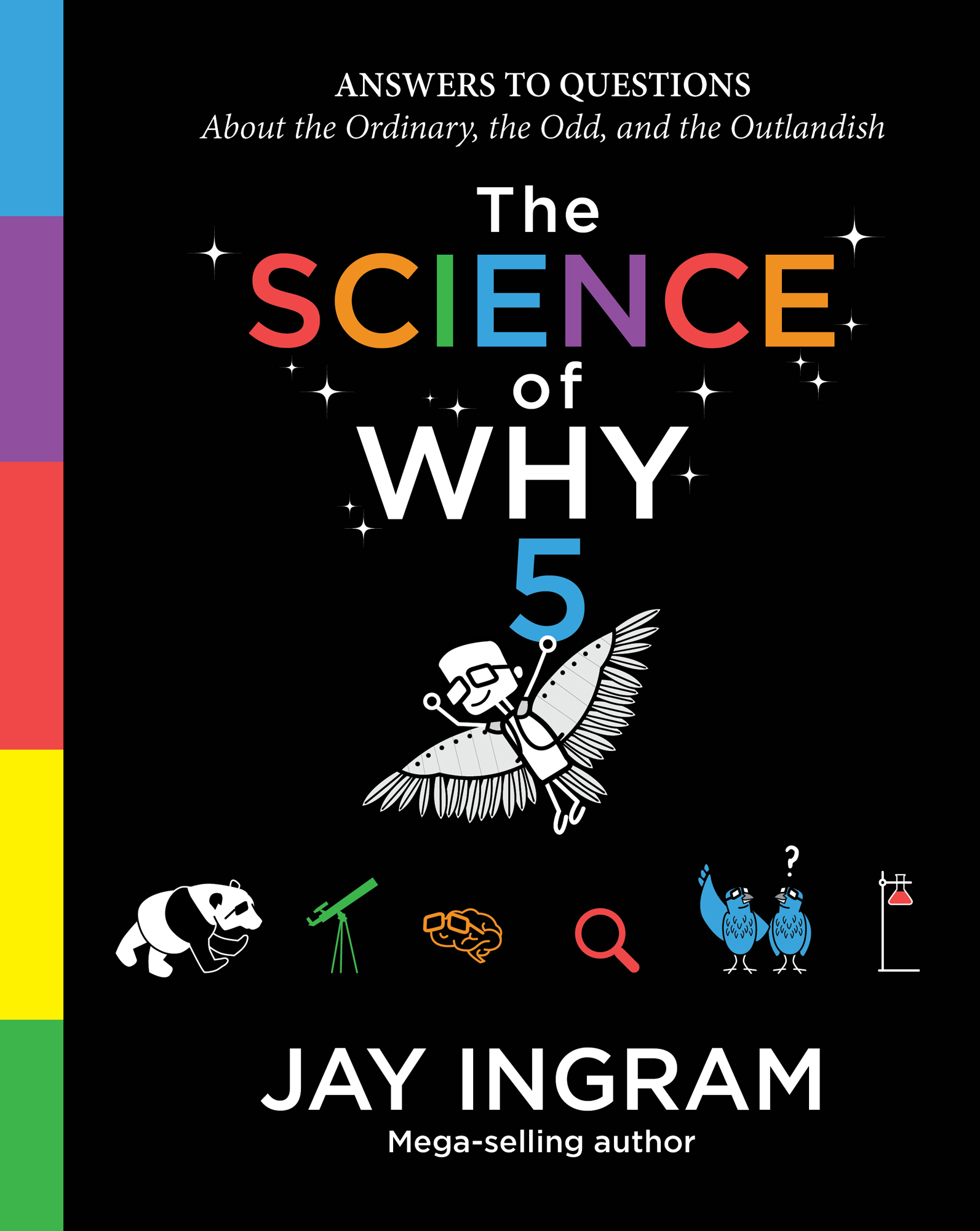Contents
Guide
Also by Jay Ingram
The Science of Why, Volume 4: Answers to Questions About Science Facts, Fables, and Phenomena
The Science of Why, Volume 3: Answers to Questions About Science Myths, Mysteries, and Marvels
The Science of Why2: Answers to Questions About the Universe, the Unknown, and Ourselves
The Science of Why: Answers to Questions About the World Around Us
The End of Memory: A Natural History of Aging and Alzheimers
Fatal Flaws: How a Misfolded Protein Baffled Scientists and Changed the Way We Look at the Brain
Theatre of the Mind: Raising the Curtain on Consciousness
Daily Planet: The Ultimate Book of Everyday Science
The Daily Planet Book of Cool Ideas: Global Warming and What People Are Doing About It
The Science of Everyday Life
The Velocity of Honey: And More Science of Everyday Life
The Barmaids Brain and Other Strange Tales from Science
The Burning House: Unlocking the Mysteries of the Brain
A Kids Guide to the Brain
Talk Talk Talk: Decoding the Mysteries of Speech
Its All in Your Brain
Real Live Science: Top Scientists Present Amazing Activities Any Kid Can Do
Amazing Investigations: Twins

Simon & Schuster Canada
A Division of Simon & Schuster, Inc.
166 King Street East, Suite 300
Toronto, Ontario M5A 1J3
www.SimonandSchuster.ca
Copyright 2020 by Mr. Science Productions Inc.
All rights reserved, including the right to reproduce this book or portions thereof in any form whatsoever. For information, address Simon & Schuster Canada Subsidiary Rights Department, 166 King Street East, Suite 300, Toronto, Ontario, M5A 1J3.
This Simon & Schuster Canada edition November 2020
SIMON & SCHUSTER CANADA and colophon are trademarks of Simon & Schuster, Inc.
For information about special discounts for bulk purchases, please contact Simon & Schuster Special Sales at 1-800-268-3216 or .
Illustrations by Tony Hanyk (tonyhanyk.com)
Library and Archives Canada Cataloguing in Publication
Title: The science of why. Volume 5 : answers to questions about the ordinary, the odd, and the outlandish / Jay Ingram.
Names: Ingram, Jay, author.
Description: Simon & Schuster Canada edition.
Identifiers: Canadiana (print) 20200202308 | Canadiana (ebook) 20200202316 | ISBN 9781982140854 (hardcover) | ISBN 9781982140861 (ebook)
Subjects: LCSH: SciencePopular works. | LCSH: ScienceMiscellanea.
Classification: LCC Q162 .I555 2020 | DDC 500dc23
ISBN 978-1-9821-4085-4
ISBN 978-1-9821-4086-1 (ebook)
To the memory of Penny Park, a longtime friend and colleague, who knew more about science journalism than just about anybody and brought to it a determined ethical stance
The Science of Why Volume 5

Part 1 Awesome Animals
Are octopuses from outer space?
I N 2018, THIRTY-THREE SCIENTISTS published an article in the journal Progress in Biophysics and Molecular Biology arguing that octopuses are actually alien life-forms that arrived on earth on a space rock 270 million years ago.
Yes, you read that correctly.
And, yes, its as crazy as it sounds. Octopuses are unique is so many ways that one scientist has said, Its like meeting an intelligent alienbut he didnt mean that literally.
This theory is an attempt to explain why the octopus is so different, especially genetically, from even close relatives like the chambered nautilus. But its not just about the genes: octopuses have a bit of an alien look. Theyre also extremely smart, can change pattern and color to blend into their surroundings, and each of their eight arms has its own brain. That last fact alone puts the octopus in a class by itself.
Octopuses have a legendary ability to escape aquariums. They can use tools and solve problems, and they seem able to think in an almost humanlike way. One well-known experiment tested octopuses on their ability to open a complicated set of boxes to get at a crab treat inside. The first box had a latch that needed to be twisted open; inside that was another box, which slid to open; and that in turn was inside a third box, which had two different locks. Two or three trials was all octopuses needed to be able to open all the boxes in three or four minutes.
What makes an octopus so smart? Its nervous system has 500 million neurons, ranking it somewhere between the European rabbit and the western tree hyrax, an African guinea piglike animal. But the number of neurons alone isnt a good measure of intelligence. The way those neurons are organized is important, too, especially in the octopus.
Of the octopuss 500 million neurons, 150 million are found in the brain, and the other 350 million are shared among the arms. In effect, each arm has its own minibrain and is capable of making its own decisions. If one of the suckers detects something delicious, for example, that arm will alert the other arms to whats happening. Then the arm will curl around the food, making a kind of hand, while the rest shapes itself into an upper and lower arm and an elbow so that the hand can bring the food to the mouth.

Science Fact ! Eerily, an arm thats been separated from an octopuss body will still grab food and try to pass it to where the mouth should have been. It will also try to crawl away on its own.
What sets octopuses apart? The chambered nautilus, a cousin, is not nearly as intelligent. Some experts think the key difference is that the nautilus never lost its shell. It leads a relatively safe and lengthy life (it can live up to twenty years), but perhaps not the most exciting one. The octopus, on the other hand, lost that shell completely as it evolved into its modern form. The argument is that losing the protection of the shell put evolutionary pressure on the octopus to become smart, agile, well camouflaged, and capable of squeezing into the tiniest spaces. The trade-off is that it typically survives only two or three years in the wild.

All of these features make the octopus an extraordinary creature, but the scientists arguing for its alien origin concentrate only on its genes. Genes build animals, but octopuses do it in a different way. They are genetically nimble and can apparently alter the way their genes are expressed, allowing them to respond rapidly to changes in their environment. But that nimbleness reduces the octopuss ability to fine-tune its DNA over longer periods of time, the process that drives evolution. This machinery is not unique to octopuseswe humans have it, toobut in most other species, its a tiny feature of the genome, whereas in the octopus it is absolutely crucial.















